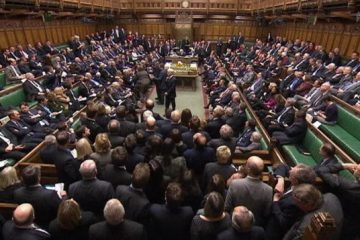
Brexit from the back benches: have the whips become the straw men of British politics?
The liberal philosopher A.C. Grayling is one of the foremost opponents of Brexit. No doubt he salutes the bravery of those Tory MPs dubbed ‘mutineers’ by the Daily Telegraph when they brought about Theresa May’s first Commons defeat as they supported an amendment to her EU withdrawal bill to give Parliament a legal guarantee of a vote on the final Brexit deal”. These Tory MPs defied the so-called ‘party whip’. Whips are MPs appointed by parties in Parliament to do what they can to make sure party members vote the way the party wants. Grayling is not a fan of the whipping system in general: he regards whipping as ‘undemocratic’, and he connects it to increasing levels of mistrust in MPs and …

Inclusive Democracy: Labour Party’s Election Manifesto for Reducing the Voting Age to 16
The prevailing sentiment among most Britons towards Labour’s proposed initiative to extend voting rights to 16-year-olds is scepticism. However, the precedents set by nations such as Scotland, Brazil, and Austria, where the voting age has been lowered to 16, challenge these apprehensions. Contrary to popular belief, implementing such a policy could cultivate a more politically active and engaged citizenry in their later years. During his election campaign, Labour leader Keir Starmer endorsed reducing the legal voting age from 18 to 16, indicating a potential inclusion of this policy in the party’s manifesto. The Labour party has deliberated the matter for more than a year, considering its implementation in Scotland and Wales for local and devolved parliamentary elections. In his statement, …

Finger-Pointing Across the Channel: EU as ‘Other’ in UK Government’s Post-Brexit Discourse
Despite leaving, the EU remains the UK’s significant, constitutive other. Even post-Brexit, the British sense of self is being claimed by defining the EU as ‘Other’. Naturally, since 2016, the character of this ‘Other’ has evolved. Following the referendum, and especially Brexit itself, the UK-EU relationship has undergone a transformation of redefining each/the other. One might have expected that, once the UK had left the EU, the mutual relationship would run more smoothly. Yet, the opposite has been the case. Boris Johnson’s government was keen to pick fights with the EU and “regularly and deliberately spark arguments” with it. Since the UK (nominally and practically) left the EU on 31 December 2020, the mutual relationship has been marred by numerous …

Review of Alt-Finance: How the City of London Bought Democracy by Marlène Benquet and Théo Bourgeron (Pluto Press, 2022)
For years academic literature and broader public debates have largely framed the Brexit referendum as a ‘popular revolt against the elites’. While some emphasised the role of economic factors and others boiled it down to anti-immigration attitudes, most accounts seem to converge around this bottom-up perspective that ordinary people disillusioned with the elites have driven the UK out of the EU. Conversely, apart from a few dissenting voices, the idea that economic elites have been mostly opposed to Brexit has been the prevailing view in the literature. Challenging the over-emphasis on the voting process, Marlène Benquet (University of Paris Dauphine) and Théo Bourgeron (University of Edinburgh) invite us to look more closely at the role played by the economic interests …

OxPol Blogcast. Women In Politics – In Conversation with Mary Ann Sieghart: Is There a Gendered Authority Gap?
OxPol Blogcast showcases research, analysis, insights, and experiences from the members of the University of Oxford’s Department of Politics and International Relations (DPIR), and specialist guests from the Oxford academic community and beyond. Are women taken less seriously than men in politics? What causes the authority gap, and how is it manifested? On this episode of the OxPol Blogcast, host Anastasia Bektimirova welcomes Mary Ann Sieghart, the author of the best-selling book The Authority Gap: Why Women Are Still Taken Less Seriously Than Men, and What We Can Do About It. Having spent three decades covering British politics as a journalist, Mary Ann draws on her observations and interviews with fifty of the world’s most powerful, successful and authoritative women to discuss the experiences and causes of the …

Pro-Innovation and Pro-Ethics? Threading the Needle in UK AI Policy
Throughout the recent political turmoil in Downing Street, the civil service has continued to develop policy on artificial intelligence, including by developing its 2021 National AI Strategy through a more detailed policy paper (titled ‘Establishing a pro-innovation approach to regulating AI’) that gives further guidance about the intended approach. This policy paper is of domestic and international importance, as the new Prime Minister Rishi Sunak looks to capitalise on the UK’s AI potential at a time when governments worldwide grapple with how to regulate the emerging technology. Notably, the tone of the paper, as introduced by then-ministers Nadine Dorres and Kwasi Kwarteng, emphasises a ‘proportionate, light-touch and forward-looking’ attitude that looks to ‘unleash growth and innovation’ in the field. The framing of an …

OxPol Blogcast. Women in Politics – Violence Against Women in Political and Public Life
OxPol Blogcast showcases research, analysis, insights, and experiences from the members of the University of Oxford’s Department of Politics and International Relations (DPIR), and specialist guests from the Oxford academic community and beyond. On this episode, we discuss how gender-based violence, one of the most devastating human rights issues of our time, manifests itself in political and public life. OxPol Blogcast host Anastasia Bektimirova welcomes four guests to unpack the issue of violence against women, the many forms it can take, how the experiences vary between serving politicians and candidates, men and women, and the activities, initiatives and mechanisms that are in place to combat it and help those who have become victims. With Reem Alsalem, the United Nations Special Rapporteur on violence against women, its causes and …

“Laters, baby!”: How the British Prime Ministers’ discourse of delay turned Indyref2 into a peripheral issue
Scotland held a vote on independence on 18 September 2014, with 55 percent of the voters rejecting leaving the United Kingdom. Yet, the issue was thrust back into the spotlight in 2016, when the UK voted to withdraw from the EU, with repeated calls for a second Scottish plebiscite growing louder ever since. As in 2014, the generally accepted (albeit not universal) position has been that Westminster’s approval is needed to put a referendum on Scottish independence beyond legal doubt. The two British Prime Ministers (PMs) who held office during this time (2016–2021), Theresa May and Boris Johnson, consistently reiterated their opposition to another referendum and ruled out granting any such consent. In doing so, they employed various discourse strategies …

Do local election victories herald national gains in Britain? How to measure success
Do local elections matter? In Britain, like in many other countries, we often see them as crucial indicators of the future general election performance of political parties and their leaders. They also have national political significance. Local election success in 2009 brought good press for former Prime Minister David Cameron before his national victory a year later; huge losses in local elections in 2019 helped sink the leadership of his successor Theresa May. Yet, the methods used to study local elections in Britain do not provide a clear or consistent indicator of how well parties are doing nationwide or how they will go on to fair at future national polls. The 2022 local elections, for instance, provided just such a …








